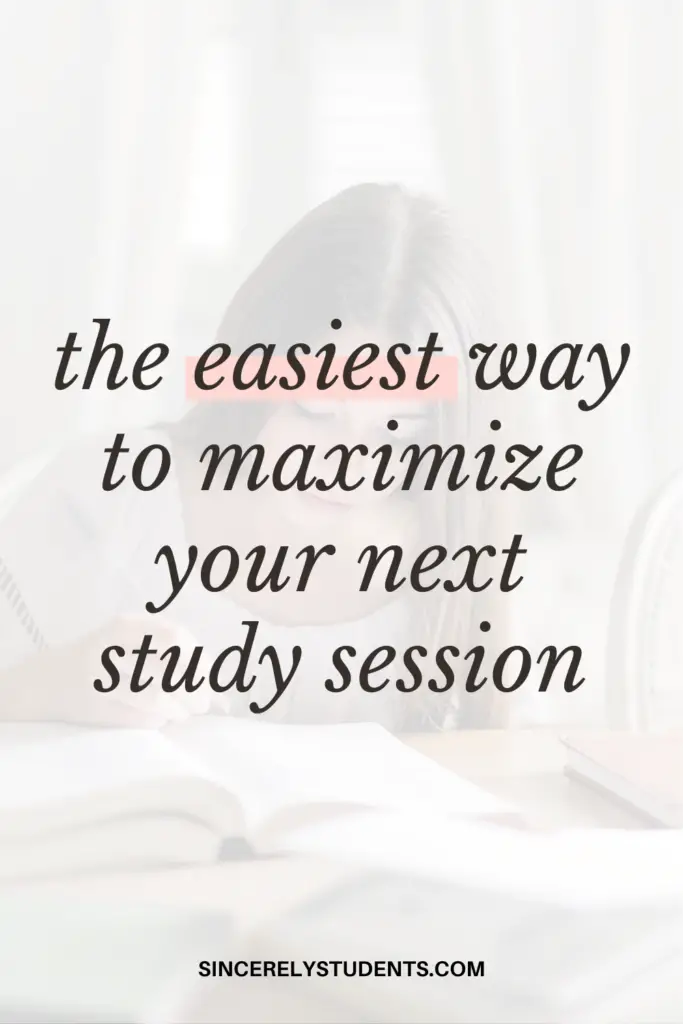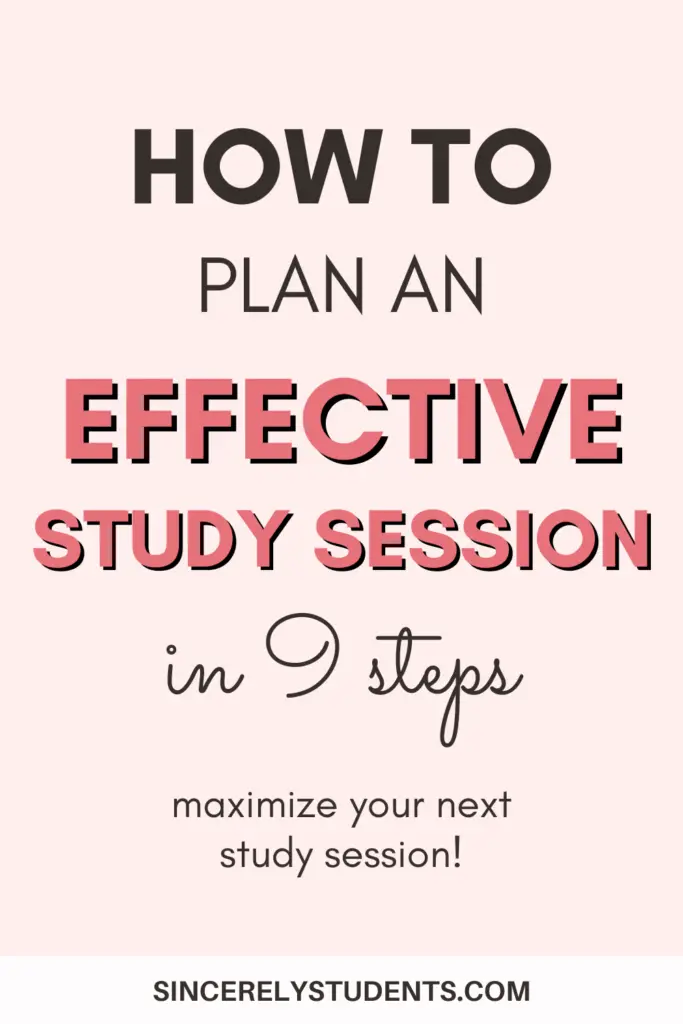Studying effectively and efficiently can be a challenge. Whether you have a single project or 7 projects due next week, it can be frustrating not knowing where to start and how to study.
Holding study sessions is an insanely helpful way to beat these challenges. Discussing with others will help you further your understanding and more easily remember what you studied. But how do you hold a productive study session? Follow these 9 tips to have the perfect study session.

Have The Right Supplies
Having the right study supplies can motivate you and help you have the most productive study session you can. Here’s a list of the top supplies I cannot study without.
- Class/lecture notes: I always keep these handy to review while I study. Sometimes, I even add new information and notes to them!
- Pencils, pens, and highlighters: I’m always writing down quick notes for myself, so a couple of dependable stationary items are always useful.
- A dry-erase board: I find it incredibly helpful to write down little bits of information on a whiteboard because it’s so easy to draw (and redraw) connections between them.
- A bottle of water: Staying hydrated is super important! Also, there’s scientific proof that drinking water can stimulate your brain to be more focused.
- A timer: The Pomodoro method is a popular productivity trick, and a timer or stopwatch is the perfect tool to keep you accountable for your time.
These are just a few supplies I find helpful; if you want the complete list, check out 10 Essential Things To Bring To Every Study Session!
Plan Ahead
Way before you hold your study session, you must determine the following (in order):
- What you need to study.
- Who you will study with.
- When you will study.
- How you will study.
- Where you will study.
What you need to study
Figure out what you need to study by first understanding what your assessment is going to be on. Know what section, chapter, or unit it’s on and prepare accordingly. Next (and more importantly), you must know what your “weak spots” are and target them.
Know what concepts you have trouble with and which type of questions you always get wrong. Instead of studying the things you know well, focus your energy on these “weak spots” to strengthen them.
Who you will study with
Next, you must determine who you’re going to study with – choose wisely. You can study alone, with a partner, or with a group of friends. These study buddies don’t have to be your best friends, but you should be able to help each other out while studying. This means they should be studying for the same class as you and be able to cooperate with you productively.
When you will study
Time is a very important factor to consider. Take into consideration 2 aspects of it as you settle when you will study: how much time you have and how much time you need. If your test is in 2 days, you don’t have much time. If you know you have a lot of information to review and relearn, you need a lot of time. If you have a combination of the two, you need to study ASAP.
How you will study
Will you isolate yourself for 2 hours and review all your notes and textbooks without rest? Or will you host a casual and fun study session with a couple of friends? Will you focus on the discussion of main ideas, or will you quiz each other on important concepts and terms? Determine which way is the most effective for you and for this test and use that method.
Where you will study
For some people, location doesn’t matter. They can focus anywhere and everywhere, and no amount of distraction will deter them. Meanwhile, others don’t have the same ability. If you’re in the latter, opt for a quiet, isolated space if you’re studying alone, or another relatively private area if you’re in a group. I always enjoy going to a friend’s house or a café while in a group.
Organize Your Space
If you’re studying alone at home, your desk is your best bet for having a focused and productive study session. The prerequisite being an organized and clean desk. Having a messy study space can clutter your mind and distract you from work. By contrast, a clean desk will help you concentrate better while studying.
So what’s the best way to organize your study space? My number 1 tip is to keep the helpful tools within reach and the un-helpful distractions way out of reach.
Your study supplies, notes, healthy snacks, etc, should be near or on your desk. Meanwhile, things like gaming consoles, your phone (especially if you have social media notifications on), and Hot Cheetos should not be at your desk. These are distracting elements that will decrease your productivity.
Eliminate Distractions
While it’s relatively easy to hide your gaming consoles away for a few hours, it can be challenging to part yourself from your phone for even half an hour. I know, I’ve been there.
However, a smartphone is one of the most distracting things a student can ever come across. True, your phone can be super helpful sometimes with the smart calculator, PDF scanner, and whatnot. But it also holds Instagram, Snapchat, Twitter, YouTube, you name it. These can make your phone addicting and highly distracting.
In order to truly have a productive study session, you must break your phone addiction– even just for a few hours. The easiest way to help you do this is to turn off all social media notifications (including badges). You don’t need to delete them, but notifications are a no-no.
Turning off notifications is just the first step towards breaking your phone addiction, but it’s an essential one for students in a study session.
YOU’LL LOVE THIS POST: How To Break Your Phone Addiction In 5 Simple Steps
Use What You Have
You’re not alone in your fight to master whatever you’re studying. If you have access to some resources (and you’re allowed to use them), take advantage of them! Some of my favorite resources I depend on include:
- My own notes and previous tests and error analysis.
- Practice workbooks like Barron’s and Princeton’s review books.
- YouTube channels like CrashCourse, Bozeman Science, Khan Academy, etc.
- Online study guides from SparkNotes, Shmoop, Fiveable, etc.
- My teacher – feel free to reach out to your teachers with questions!
- My friends – they can provide emotional and educational support!
Try Different Approaches
I mentioned in Plan Ahead > How you will study some different methods of studying. Trying different approaches in your study sessions is a great way to practice your brain in different ways as well as discover the most effective method for you.
There are countless options as to what you can do. Some are fun, some are intense, and others are a combination of the two. Here are some methods you can try:
- Going over flashcards.
- Drawing (random) connections.
- Quizzing yourself / each other with your friends.
- Take practice tests.
- Drawing diagrams and pictures.
- Reciting information.
- Teaching someone else the information.
- Playing Heads-Up with study terms.
- Playing Draw Something with study terms.
Take Breaks
Taking breaks is one of the most important and easy ways to recharge your brain to maximize its productivity during a study session. You’ll be able to take in the greatest amount of information you can while not burning out.
One way to schedule breaks is with the Pomodoro method. The Pomodoro technique is a popular productivity trick among students and adults alike. This time management method has been around since the 1980s and is super simple to implement.
All you need to do is choose 1 or a few tasks to focus on, set a timer for 25 minutes, focus on your task until the timer is up, take a 5-minute break, and repeat.
These intervals are carefully designed to make sure your brain is the most productive it can be. However, you can customize this method however you want to be the most productive you can be. One way I like to do this is to set intervals by topic instead of by time.
This way, I study 1 topic until I feel comfortable with it. This could take me anywhere from 20 minutes to 2 hours. Then, I take a short break between 5-15 minutes. I repeat this process until I’ve mastered all the topics.
Review, Review, Review!
You should be reviewing your notes and other information all the time to ensure maximum intake and memorization. However, reviewing after a study session is one of the most undervalued study tricks.
If you had a productive study session, information– new and old– should be relatively fresh in your brain. But, and this is especially true if you studied with a group, some knowledge may not have resonated with you as strongly as others. Take this time to go over them quickly to make them stick.
This review after your study session will be like the top coat over your nail polish; it will help your brain remember all the information you received and solidify your understanding.
Track Your Progress
If you have time for multiple study sessions, you must track your progress before and after each one. One way of doing this is to set goals.
Before each study session, set a few academic goals. These are short-term goals that will help you reach your long-term goal (doing well on your exam).
Some examples of goals you can set are:
- Master 1 chapter/concept.
- Memorize 30 vocabulary terms.
- Complete 1 practice test.
- Write 1 practice essay.
Then after each study session, track your progress by seeing if you completed your goal then setting a new one. There are many possibilities, just make sure what you set help you to reach your long-term goals!
Conclusion
I hope this post will help you maximize your next study session and ace your next test! Follow these tips and I can guarantee that you have a productive study session.
If you’re looking for more study tips, check these out:
- 7 Terrible Study Habits To Quit Immediately
- 9 Essential Study Skills To Study Smarter, Not Harder
- 7 Better Monthly Habits Of The Smartest Students
